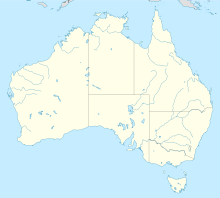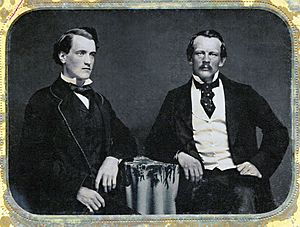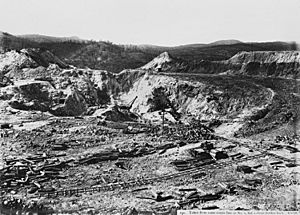Mount Morgan Mine facts for kids
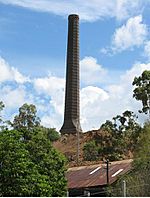
Mount Morgan Mine Stack, 2010
|
|
| Location | |
|---|---|
| Location | Mount Morgan |
| State | Queensland |
| Country | Australia |
| Coordinates | 23°38′28″S 150°22′31″E / 23.64111°S 150.37528°E |
| Production | |
| Products | Copper Gold Silver |
| Production | Copper: 387,000 tonnes Gold: 262 tonnes Silver: 37 tonnes |
| Financial year | 1882 - 1981 |
| History | |
| Opened | 1882 |
| Closed | 1981 |
| Owner | |
| Company | Norton Gold Fields |
| Year of acquisition | 2007 |
The Mount Morgan Mine was a very important mine in Queensland, Australia. It dug up valuable metals like copper, gold, and silver. Mining started at Mount Morgan in 1882 and continued for almost 100 years, until 1981.
During its time, the mine produced huge amounts of metals. It yielded about 262 tonnes of gold, 37 tonnes of silver, and 387,000 tonnes of copper. The Mount Morgan Mine was once known as the largest gold mine in the world!
Besides digging, the mine also had its own workshops. These included places to test metals, make bricks, and fix machinery. It even had special caves called Fireclay Caverns where clay was dug out to make bricks for the mine.
The money made from the Mount Morgan Mine helped start big projects. Some of it funded oil exploration in Persia (now Iran), which led to the creation of the Anglo-Persian Oil Company. This company later became BP, a well-known oil company today. Money from the mine also helped set up the Walter and Eliza Hall Institute of Medical Research in 1912, which is a famous medical research center.
Contents
Mine History: A Golden Journey
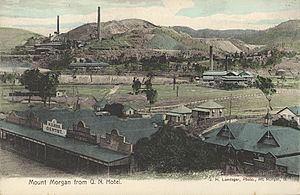
The area around the mine has different types of rocks, including sedimentary and igneous rocks. The gold found here was very pure, rated at 0.998 fine.
How It All Began (1882-1886)
In 1882, a group of people decided to open a gold mine. This mine was located at a place called Ironstone Mountain. This mountain was about 39 kilometers (24 miles) south of Rockhampton, Queensland.
This group was called a syndicate. It included important people like William Knox D'Arcy, Walter Russell Hall, and Thomas Skarratt Hall. It also included three brothers: Thomas, Frederick, and Edwin Morgan. Ironstone Mountain was later renamed Mount Morgan, after the Morgan brothers who were part of this group.
The Gold Mining Company (1886-1928)
In October 1886, the syndicate officially became a company. It was called the Mount Morgan Gold Mining Company Limited. James Wesley Hall, who was Walter and Thomas Hall's younger brother, became the first general manager.
This company used underground mining methods. This means they dug tunnels deep into the earth to get the gold. This continued until 1927. In that year, a big fire destroyed the underground tunnels. Because of the fire, the company decided to flood the underground parts of the mine. After this, the company closed down.
By 1907, the mine had already produced a huge amount of gold, worth $60,000,000. This made it one of the most productive mines in the world at that time.
Mount Morgan Limited (1928-1990)
The Mount Morgan Mine was reopened in 1928. This time, it operated as a new company called Mount Morgan Limited. Instead of underground mining, they switched to open-cut mining. This means they dug a large, open pit from the surface.
Changing to open-cut mining meant they updated a lot of their equipment and methods. In 1968, Mount Morgan Limited became part of another company called Peko Wallsend Limited. The mine kept working until 1974. Around this time, they started running out of valuable ore.
The company slowly reduced its workers and operations. By 1981, they had reached the very end of the ore they could dig up.
From 1982 to 1990, Mount Morgan Limited started processing the leftover materials from its earlier mining. These leftover materials are called tailings. The mine's facilities were also used to process materials from other Peko Wallsend mines. When these operations ended in 1990, the Queensland Government began talking about how to close the mine properly.
Recent Times and Future Plans
The Queensland Government took over managing the mine site in 1992. Later, in 1992, another company started exploring the area. They looked for more minerals and made plans for possibly processing more materials in the future.
Since 2007, the mine and its mining areas have been owned by Norton Gold Fields. Experts believe there might still be about 327,000 ounces of gold left at the site.
The Mine's Wider Impact
The Mount Morgan Mine's success had a big impact beyond just mining.
How BP Was Formed
William Knox D'Arcy was one of the original people who started the Mount Morgan gold mine. He used the money he earned from the mine to fund a search for oil in Persia. In 1908, they successfully found oil! This led to the creation of the Anglo Persian Oil Company. This company later changed its name to The British Petroleum Company, which is now known as BP.
Medical Research Institute
Walter Russell Hall was also part of the original group that started the Mount Morgan Gold Mine. When he passed away in 1912, he left a lot of his personal wealth to create the Walter and Eliza Hall Trust. This trust was then used to establish the Walter and Eliza Hall Institute of Medical Research in 1915. This institute has become a very important center for medical discoveries.
Mount Morgan Mine Today
Today, the old Mount Morgan mine site is a popular place for tourists to visit in Central Queensland. You can still see some of the old mine buildings, like the General Office, the Gold Rooms, and the tall Main Stack. There's also a special viewing spot called the Arthur Timms lookout. From here, you can see the remaining mine buildings and the town of Mount Morgan.
The water in the mine pit has high levels of metals like copper, aluminum, and magnesium. To manage this, the site has a water treatment plant. This plant helps clean the water. Sometimes, during heavy rain, controlled amounts of water are released into the Dee River to prevent uncontrolled flooding. This happened in March 2011, and again in January and February 2013.
In June 2011, the Queensland Government announced $24.2 million in funding. This money was for cleaning up and managing the site. On January 26, 2013, the mine pit filled with water and overflowed into the Dee River for the first time ever.
A mining company once planned to get more gold and copper from the leftover materials at the site. They also wanted to help with the mine's acid drainage problem. However, they decided not to go ahead with the plan in 2018 because they weren't sure it would be financially successful.
Cleaning up the environmental issues from the old gold mine is a big job. Estimates for a partial cleanup start at $450 million. The full cost of completely restoring the site has not yet been calculated.
 | Delilah Pierce |
 | Gordon Parks |
 | Augusta Savage |
 | Charles Ethan Porter |


